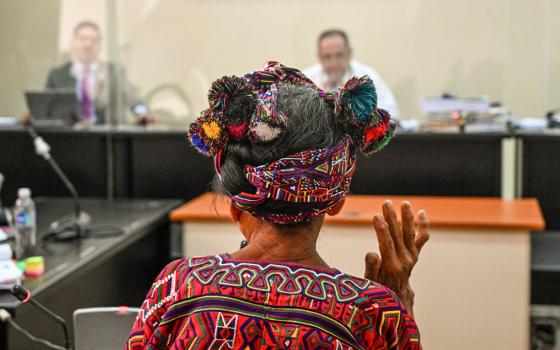
INDIANAPOLIS -- Bemoaning the "sad state of today's political environment," Carl Anderson, supreme knight of the Catholic fraternal organization the Knights of Columbus, urged Catholics to move beyond partisan politics and forge a new political coalition based on the rich tradition of Catholic social teaching.
Catholics "are uniquely positioned to offer a solution" to change today's political environment, Anderson said in the keynote address at the 2012 Catholic Media Conference, held by the Catholic Press Association and the Catholic Academy for Communications Arts Professionals in Indianapolis. Anderson said politics today are intransigent, gridlocked and destructive, and make "the search for solutions virtually impossible."
"We have an extraordinarily rich tradition of social teaching and the experience that much of American history has been shaped by Catholics," Anderson said.
The fight to overturn a recent federal mandate requiring coverage of contraceptive services in health care plans, which gives a narrow exemption for certain employers deemed religious -— a cause célèbre for the U.S. bishops —- could be the impetus needed to begin forging a political coalition based on Catholic social teaching that could influence the policy positions of both political parties, Anderson said.
In the Friday night speech to 300 Catholic media professionals, Anderson spoke about the Knights of Columbus' Moral Compass Project, a joint project with the Marist Institute for Public Opinion that has been tracking American attitudes on ethical questions since 2008. The poll shows that "Americans share a broad moral and even spiritual consensus that often tracks closely with Catholic social teaching," and that attraction transcends party lines, Anderson said.
Despite this strong spiritual consensus, no successful Catholic coalition has been formed because of what Anderson called the "Cuomo Doctrine."
"One of the great obstacles to forming a successful Catholic coalition on the life issue was the position Gov. Mario Cuomo articulated in a 1984 speech at the University of Notre Dame," Anderson said. "He defended his position of being personally opposed to abortion but unwilling to take a position opposing abortion because this would mean imposing his beliefs on his fellow citizens.
"The force with which Gov. Cuomo made his argument and its widespread acceptance effectively inoculated a generation of 'pro-choice' Catholic politicians. The result has been a political stalemate on the abortion issue for nearly three decades," he said.
It also "created an environment in which it became easier for candidates to dismiss other principles of Catholic social teaching."
"As Catholics, we must stop picking and choosing which parts of Catholic social teaching we will accept," Anderson said. "And we must insist that our politicians stop doing this as well."
Once Catholic voters persuade both political parties to come into alignment with the fundamentals of Catholic social teaching, then the nation can "debate and vote on the full range of Catholic social teaching -- including prudential issues that raise serious moral questions," Anderson said.
"But to be able to effectively do this, we must first refuse to support candidates who advocate policies that are intrinsically evil," he said.
Anderson urged Catholic voters "to act boldly" and "have the courage to tell candidates that if they want Catholic votes they will have to respect the fundamental principles of Catholic social teaching, such as the sanctity of human life before birth as well as the institutions of marriage and family."
"Catholic voters should have the courage ... to withhold their vote from candidates who fail this test -- even if it means at times that they will withhold their vote for both candidates for a particular office," he said.
The "peaceful co-existence" with secular culture that has been the status quo under the Cuomo Doctrine ended this year because of the Department of Health and Human Services' mandate on contraception, Anderson said.
"Our bishops tell us that, if implemented, the HHS mandate will affect the autonomy and integrity of our church and its institutions -- that it will dramatically change the mission of the Catholic church in the United States," he said.
"Catholics can no longer accept politics as usual," Anderson said. "Shouldn't our goal as Catholics be a political environment where Catholic voters can choose between candidates who are in agreement on the fundamental social teaching of the church? And if so, how would that new reality change the platforms of both our major political parties regarding other principles of Catholic social teaching?"
"I cannot predict the answers to these questions, nor can I say which political party would benefit. I cannot say how our political parties may change during the next decade if politicians take seriously Catholic social teaching.
"But the outcome could be a new political coalition in which Catholics would play an irreplaceable role. This is not promoting partisan politics -- it is the opposite of partisanship," he said.
The full text of Anderson's talk can be found here.
[Dennis Coday is NCR editor. His email address is dcoday@ncronline.org.]



